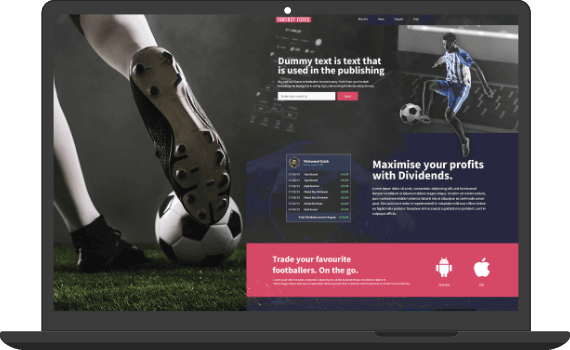suncity asia
₫235.157
suncity asia - cung cấp trải nghiệm game bài đổi thưởng đáng tin cậy với 88k tiền thưởng chào mừng và dịch vụ nạp rút siêu tốc 30 giây.
Product description
Leveraging Odds Comparisons
In the modern soccer betting landscape, bettors have access to a wide range of bookmakers and betting exchanges. Analytical tools can facilitate the comparison of odds across multiple platforms, enabling bettors to identify the most favorable prices and maximize their potential returns.
Predicting the Unexpected: Using Statistical Models to Identify Soccer Betting Opportunities
Identifying Value Bets
One of the primary benefits of using analytical tools in soccer betting is the ability to identify value bets. By applying statistical models and predictive algorithms, bettors can uncover instances where the bookmaker's odds may not accurately reflect the true probability of a particular outcome, creating opportunities for profitable wagers.
Competitive Edge in the Market
In the highly competitive world of soccer betting, the use of analytical tools can provide bettors with a significant competitive edge. By leveraging data-driven insights and predictive capabilities, bettors can identify opportunities that may be overlooked by those relying solely on intuition or traditional betting methods.
Advanced Metrics
In addition to traditional performance metrics, advanced analytical tools have introduced a range of sophisticated metrics to the soccer betting landscape. These include expected goals (xG), which measure the quality of goal-scoring opportunities, and possession-adjusted metrics, which provide a more nuanced understanding of a team's overall performance.
By embracing the power of analytical tools and navigating the associated risks and challenges, bettors can unlock a new level of success in the dynamic and ever-changing world of soccer betting. The journey from gut feelings to calculated bets has only just begun, and the future of soccer betting is firmly rooted in the intersection of data, technology, and strategic decision-making.
Navigating the Risks: Using Analytical Tools to Manage Variance and Minimize Losses
Understanding Variance and Volatility
Soccer betting, like any form of gambling, is inherently subject to variance and volatility. Analytical tools can help bettors better understand and quantify these risks, enabling them to make more informed decisions about bet sizing, bankroll management, and overall risk exposure.
Contextualizing Match Results
When evaluating a soccer team's performance, it's crucial to look beyond the final scoreline. Analytical tools can help bettors delve deeper into the underlying factors that contributed to a team's result, such as shots on target, possession, and pass accuracy. By understanding these contextual elements, bettors can better assess a team's true strengths and weaknesses, leading to more informed betting decisions.
See more: kèo nhà cái w88
Understanding the Odds: How Analytical Tools Help Decode Bookmaker Probabilities
Deconstructing Bookmaker Pricing
Bookmakers employ sophisticated algorithms and models to set their odds, and analytical tools can help bettors understand the underlying logic behind these pricing mechanisms. By analyzing factors such as market sentiment, historical data, and bookmaker tendencies, bettors can gain insights into how bookmakers arrive at their odds, enabling them to identify potential discrepancies or mispriced markets.
See more: đăng ký bong88
Deciphering the Numbers: Exploring Key Analytical Tools for Soccer Betting

The Future of Soccer Betting: The Role of Artificial Intelligence and Big Data
Advancements in Predictive Analytics
As the field of data science and machine learning continues to evolve, the potential for more sophisticated predictive analytics in soccer betting is on the rise. Artificial intelligence (AI) and advanced algorithms can analyze vast amounts of data, identify complex patterns, and generate highly accurate predictions, providing bettors with an even greater advantage in the market.
Leveraging Automation and Technology
As the use of analytical tools in soccer betting becomes more widespread, bettors can leverage automation and technology to streamline their decision-making process. From automated data gathering to algorithmic betting strategies, these technological advancements can enhance efficiency, reduce human error, and ultimately improve the overall effectiveness of a betting approach.
Leveraging Big Data and IoT Sensors
The growing availability of big data and the increasing use of Internet of Things (IoT) sensors in the sports industry are also transforming the soccer betting landscape. By integrating these data sources, analytical tools can provide bettors with real-time insights into player performance, team dynamics, and in-game events, enabling more informed and timely betting decisions.
However, the increasing reliance on analytical tools also brings forth a need for responsible and ethical practices. Regulatory oversight, data privacy considerations, and the mitigation of algorithmic biases will be crucial in ensuring the integrity and fairness of the soccer betting industry.
Personalized Betting Recommendations
As analytical tools become more sophisticated, the potential for personalized betting recommendations tailored to individual bettors' preferences and risk profiles is also increasing. By leveraging machine learning algorithms and user data, these tools can provide bettors with customized betting strategies and suggestions, further enhancing their decision-making capabilities.
Monitoring Odds Movements
Analytical tools can also assist bettors in tracking and monitoring odds movements over time. By understanding how odds fluctuate in response to various factors, such as team news, public sentiment, and betting activity, bettors can identify opportunities to place bets at advantageous prices or capitalize on market overreactions.
Beyond the Scoreline: Analyzing Team Performance Metrics for Informed Betting

From Gut Feelings to Calculated Bets: The Rise of Analytical Tools in Soccer

Detecting Potential Upsets
Analytical tools can also help bettors identify potential upsets in soccer matches. By analyzing factors such as team form, head-to-head records, and historical data, these tools can highlight instances where an underdog might have a higher chance of defeating a favored opponent, presenting opportunities for bettors to capitalize on.
Exploiting Market Inefficiencies
The soccer betting market is constantly evolving, and analytical tools can help bettors identify and capitalize on market inefficiencies. By monitoring factors such as line movements, betting volume, and public perception, bettors can detect instances where the market may have mispriced the odds, creating opportunities for profitable wagers.
As the field of sports analytics continues to evolve, the future of soccer betting is poised to become even more data-driven and sophisticated. With the emergence of artificial intelligence, big data, and personalized betting recommendations, the potential for bettors to gain a competitive edge in the market is greater than ever before.
Enhanced Risk Management
Analytical tools provide bettors with a better understanding of risk and variance, enabling them to make more informed decisions about bet sizing, bankroll management, and overall risk exposure. This, in turn, can lead to more sustainable and responsible betting practices.
Continuous Learning and Adaptation
The world of soccer betting is constantly evolving, and successful bettors must be willing to continuously learn and adapt their strategies. Analytical tools can help bettors stay informed about the latest trends, insights, and market developments, empowering them to refine their approach and maintain a competitive edge.
Evaluating Player Impact
Individual player performance can have a significant impact on a team's overall success, and analytical tools can help bettors assess the contributions of key players. By analyzing metrics such as goal involvement, defensive contributions, and statistical output, bettors can better understand a player's value and how their performance may influence the outcome of a match.
Conclusion
The integration of analytical tools into the soccer betting industry has ushered in a new era of data-driven decision-making. By harnessing the power of performance analytics, predictive modeling, and odds analysis, bettors can now make more informed and strategic wagers, identifying value opportunities and mitigating risks more effectively.
Understanding Opponent Strengths and Weaknesses
Successful soccer betting requires not only an understanding of a team's own performance but also a deep analysis of their opponents. Analytical tools can provide valuable insights into an opposing team's strengths, weaknesses, and specific tendencies, allowing bettors to identify potential mismatches or opportunities to exploit.
Assessing Injury and Suspension Impact
Injuries and suspensions can significantly impact a team's performance, and analytical tools can help bettors assess the potential implications. By evaluating a player's importance to the team, their replacement options, and historical data on how the team has fared in their absence, bettors can make more informed decisions on how to approach matches affected by these factors.
Monitoring and Adapting to Market Changes
The soccer betting landscape is constantly evolving, and analytical tools can help bettors stay informed and responsive to these changes. By continuously monitoring market trends, odds movements, and other relevant data, bettors can adapt their strategies and adjust their risk profiles accordingly, enhancing their long-term resilience and profitability.
Implementing Risk Management Strategies
By incorporating analytical tools into their risk management strategies, bettors can develop more sophisticated approaches to minimize losses and protect their bankroll. This may include techniques such as diversification, position sizing, and the use of stop-loss orders to mitigate the impact of adverse outcomes.
Assessing Bookmaker Biases
Bookmakers, like any market participants, can be subject to biases and tendencies that may influence their pricing. Analytical tools can help bettors identify and account for these biases, whether they stem from a bookmaker's risk management strategies, product offerings, or even geographic location.
From Amateur to Expert: The Benefits of Employing Analytical Tools in Soccer Betting
Improved Decision-Making Capabilities
By incorporating analytical tools into their soccer betting approach, bettors can enhance their decision-making capabilities, making more informed and data-driven choices. This translates into a higher degree of confidence in their wagers and increased potential for long-term profitability.







